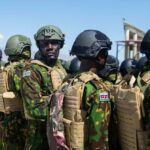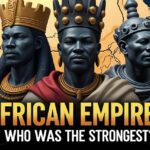When the Vietnam war is discussed in classrooms, documentaries or novels the names that rise to the surface are American, Vietnamese, French or perhaps Chinese. Rarely, if ever does the conversation extend to East Africa. Hidden within the fog of war and post-colonial transitions lies a little-known truth: a handful of Kenyans walked the muddy trails of Vietnam, not as invaders but as conscripted laborers, contracted support staff and in rare cases, foreign soldiers swept up in global tides they could not resist.
The Colonial Legacy and Military Traditions
Kenya gained independence in 1963 but before that, thousands of Kenyan men had served in the King’s African Rifles (KAR), a British colonial regiment that fought in World War II and other regional conflicts. These men were experienced, disciplined and battle-hardened. Some continued serving the British military after independence, taking contracts that led them to far- flung corners of the world.
Although Britain did not send combat troops to Vietnam, it was closely allied with the United States. British-trained military advisors and support personnel were often seconded or hired by American contractors and among them were ex-KAR soldiers from Kenya. Their names rarely appeared on any official rosters and their stories remain embedded in the silence of history.
Some of the men found themselves in Vietnam through indirect pathways. Military contracting agencies facilitated recruitment, often without specifying the exact nature of the assignments. In interviews with surviving veterans, tales emerge of Kenyan instructors and logistical experts quietly aiding American forces, their expertise drawn from years of colonial military service.
Kenya’s Diplomatic Stance on the War
As Vietnam burned, Kenya like many African nations took a measured approach to the conflict. Officially, Kenya maintained neutrality, aligned itself with the NON-Aligned Movement (NAM) a coalition of states that refused to take sides in the Cold War struggles between the U.S and the Soviet Union. Nairobi’s government did not formally send troops or issue strong statements, but key diplomatic exchanges reveal concern over imperial interventions in Southeast Asia.
In 1966 for instance, kanya participated in NAM discussions that criticized U.S involvement in Vietnam while advocating peaceful resolutions. Kenyan leaders viewed the war through a lens of decolonization, recognizing parallels between Vietnam’s resistance and Africa’s own independence struggles. Although little direct action was taken, Kenya’s stance reflected a broader sentiment across the continent solidarity with Vietnams quest for self-determination.
Private Contractors and Labor Recruitment
In the 1960s, the U.S. military relied heavily on civilian contractors to manage its vast war machine. Hiring cooks, drivers, laborers, cleaners, and mechanics. Labor agencies based in the Middle East and Europe began recruiting workers from Africa, including Kenya, for “overseas assignments.” The fine print didn’t always specify Vietnam. Men arrived in Saigon or Da Nang thinking they’d be working in peacetime logistics zones, only to find themselves within reach of combat.
Martin Wachira, whose grandfather worked in Vietnam as a driver between 1968 and 1971, recalls stories of dodging shellfire while ferrying goods between bases. “He said they were not soldiers, but that the war didn’t care. Bullets didn’t ask if you were holding a gun or a steering wheel,” Martin says.
Drafted Abroad: The Unintended Soldiers
A lesser-known path to Vietnam for Kenyans came through immigration. Some East Africans studying or working in the United States during the 1960s became entangled in the America draft system, conscripted into service due to unclear residency protections. Somewhere misidentified in military databases or lacked legal support to contest their enrollment.
While exact numbers are unknown, oral accounts suggest that at least a few Kenyans fought in U.S. uniform, their African heritage mistaken for African American identity. A Vietnam veteran based in Boston Massachusetts recalled encountering a Kenyan recruit in Boot Camp, struggling with his sudden induction into the military.
Aftermath and Silence: The Struggles of Returning Veterans
Returning from Vietnam brought little recognition or support. Those who went as contractors had no veterans’ benefits and those who served under foreign flags found themselves in a strange limbo, acknowledged by neither Kenya nor the nations they fought for.
Back home, their experiences were misunderstood or ignored altogether. Few wanted to hear about an unpopular war in a foreign land. Some returned traumatized. Others disappeared into rural anonymity, their memories buried in unmarked graves or whispered at firesides.
One retired veteran, who declined to be named, said, “We saw things in that jungle that followed us home. But who would believe that a Kenyan had stood in the Mekong Delta?”
Rediscovering Forgotten Footprints: The Search for Lost Histories
Today, efforts to uncover these hidden histories are beginning to take shape. Historians and veterans’ associations in Kenya and the UK are combing through archives, trying to piece together names and untold stories before they vanish completely.
Dr. Samuel Wainaina, a researcher specializing in African military history, is leading a project to document Kenyan experiences in Vietnam. ‘Africa’s role in global conflicts is often underexplored,’ he notes. ‘But these men existed and their contributions, whether forced or chosen deserve recognition.’
Conclusion: Echoes in the Jungle
The story of Kenyans in Vietnam is not just about forgotten fighters, it is a mirror reflecting the complex entanglements of empire, migration and memory. These were men who crossed continents not in a pursuit of glory but in search of survival, opportunity or by sheer accident of history. Some wore uniforms not their own. Others held tools instead of rifles. Yet all of them the same, feared the same and left pieces of themselves in a war that barely knew their names.
History has a bad habit of choosing its heroes. Perhaps the truest measure of a nation’s dignity lies in how it honors the unnamed, the uncounted, the nearly erased. To remember the Kenyans who walked the rice fields of Vietnam is to reclaim a stolen chapter not just of war but of humanity. It is to say: you were there. We see you now.
Their stories deserve more than silence. They deserve a place in our memory, our history books and our collective reckoning with the past. not just as a footnote in another nation’s war, but as a testament to how interconnected our histories truly are.
Related Posts
-
Bridging continents: Kenya’s mission in Haiti and the echo of shared struggles
Kenya’s deployment to Haiti marks the first African-led peace mission in the Americas. Explore the…
-
The Forgotten kingdoms of the Sahel: Ghana, Mali, and Songhai’s empires of gold and learning
From the 8th to the 16th centuries, the wide grasslands and deserts of the Sahel…
-
The Legacy of Queen Nzinga of Ndongo and Matamba
Discover the story of Queen Nzinga of Ndongo and Matamba the 17th-century African warrior queen…


